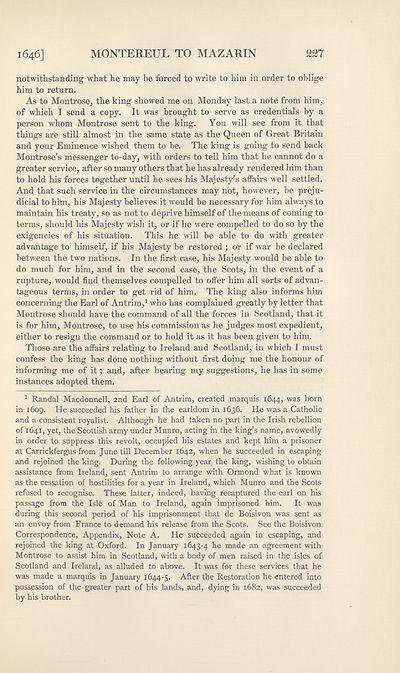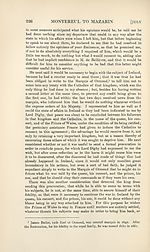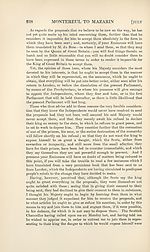Series 1 > Diplomatic correspondence of Jean de Montereul and the brothers de Bellièvre, French ambassadors in England and Scotland, 1645-48 > Volume 1
(264) Page 227
Download files
Complete book:
Individual page:
Thumbnail gallery: Grid view | List view

1646]
MONTEREUL TO MAZARIN
227
notwithstanding what he may be forced to write to him in order to oblige
him to return.
As to Montrose, the king showed me on Monday last a note from him,
of which I send a copy. It was brought to serve as credentials by a
person whom Montrose sent to the king. You will see from it that
things are still almost in the same state as the Queen of Great Britain
and your Eminence wished them to be. The king is going to send back
Montrose’s messenger to-day, with orders to tell him that he cannot do a
greater service, after so many others that he has already rendered him than
to hold his forces together until he sees his Majesty’s affairs well settled.
And that such service in the circumstances may not, however, be preju¬
dicial to him, his Majesty believes it would be necessary for him always to
maintain his treaty, so as not to deprive himself of the means of coming to
terms, should his Majesty wish it, or if he were compelled to do so by the
exigencies of his situation. This he will be able to do with greater
advantage to himself, if his Majesty be restored ; or if war be declared
between the two nations. In the first case, his Majesty would be able to
do much for him, and in the second case, the Scots, in the event of a
rupture, would find themselves compelled to offer him all sorts of advan¬
tageous terms, in order to get rid of him. The king also informs him
concerning the Earl of Antrim,1 who has complained greatly by letter that
Montrose should have the command of all the forces in Scotland, that it
is for him, Montrose, to use his commission as he judges most expedient,
either to resign the command or to hold it as it has been given to him.
Those are the affairs relating to Ireland and Scotland, in which I must
confess the king has done nothing without first doing me the honour of
informing me of it; and, after hearing my suggestions, he has in some
instances adopted them.
1 Randal Macdonnell, 2nd Earl of Antrim, created marquis 1644, was born
in 1609. He succeeded his father in the earldom in 1636. He was a Catholic
and a consistent royalist. Although he had taken no part in the Irish rebellion
of 1641, yet, the Scottish army under Munro, acting in the king’s name, avowedly
in order to suppress this revolt, occupied his estates and kept him a prisoner
at Carrickfergus from June till December 1642, when he succeeded in escaping
and rejoined the king. During the following year the king, wishing to obtain
assistance from Ireland, sent Antrim to arrange with Ormond what is known
as the cessation of hostilities for a year in Ireland, which Munro and the Scots
refused to recognise. These latter, indeed, having recaptured the earl on his
passage from the Isle of Man to Ireland, again imprisoned him. It was
during this second period of his imprisonment that de Boisivon was sent as
an envoy from France to demand his release from the Scots. See the Boisivon
Correspondence, Appendix, Note A. He succeeded again in escaping, and
rejoined the king at Oxford. In January 1643-4 he made an agreement with
Montrose to assist him in Scotland, with a body of men raised in the isles of
Scotland and Ireland, as alluded to above. It was for these services that he
was made a marquis in January 1644-5. After the Restoration he entered into
possession of the greater part of his lands, and, dying in 1682, was succeeded
by his brother.
MONTEREUL TO MAZARIN
227
notwithstanding what he may be forced to write to him in order to oblige
him to return.
As to Montrose, the king showed me on Monday last a note from him,
of which I send a copy. It was brought to serve as credentials by a
person whom Montrose sent to the king. You will see from it that
things are still almost in the same state as the Queen of Great Britain
and your Eminence wished them to be. The king is going to send back
Montrose’s messenger to-day, with orders to tell him that he cannot do a
greater service, after so many others that he has already rendered him than
to hold his forces together until he sees his Majesty’s affairs well settled.
And that such service in the circumstances may not, however, be preju¬
dicial to him, his Majesty believes it would be necessary for him always to
maintain his treaty, so as not to deprive himself of the means of coming to
terms, should his Majesty wish it, or if he were compelled to do so by the
exigencies of his situation. This he will be able to do with greater
advantage to himself, if his Majesty be restored ; or if war be declared
between the two nations. In the first case, his Majesty would be able to
do much for him, and in the second case, the Scots, in the event of a
rupture, would find themselves compelled to offer him all sorts of advan¬
tageous terms, in order to get rid of him. The king also informs him
concerning the Earl of Antrim,1 who has complained greatly by letter that
Montrose should have the command of all the forces in Scotland, that it
is for him, Montrose, to use his commission as he judges most expedient,
either to resign the command or to hold it as it has been given to him.
Those are the affairs relating to Ireland and Scotland, in which I must
confess the king has done nothing without first doing me the honour of
informing me of it; and, after hearing my suggestions, he has in some
instances adopted them.
1 Randal Macdonnell, 2nd Earl of Antrim, created marquis 1644, was born
in 1609. He succeeded his father in the earldom in 1636. He was a Catholic
and a consistent royalist. Although he had taken no part in the Irish rebellion
of 1641, yet, the Scottish army under Munro, acting in the king’s name, avowedly
in order to suppress this revolt, occupied his estates and kept him a prisoner
at Carrickfergus from June till December 1642, when he succeeded in escaping
and rejoined the king. During the following year the king, wishing to obtain
assistance from Ireland, sent Antrim to arrange with Ormond what is known
as the cessation of hostilities for a year in Ireland, which Munro and the Scots
refused to recognise. These latter, indeed, having recaptured the earl on his
passage from the Isle of Man to Ireland, again imprisoned him. It was
during this second period of his imprisonment that de Boisivon was sent as
an envoy from France to demand his release from the Scots. See the Boisivon
Correspondence, Appendix, Note A. He succeeded again in escaping, and
rejoined the king at Oxford. In January 1643-4 he made an agreement with
Montrose to assist him in Scotland, with a body of men raised in the isles of
Scotland and Ireland, as alluded to above. It was for these services that he
was made a marquis in January 1644-5. After the Restoration he entered into
possession of the greater part of his lands, and, dying in 1682, was succeeded
by his brother.
Set display mode to:
![]() Universal Viewer |
Universal Viewer | ![]() Mirador |
Large image | Transcription
Mirador |
Large image | Transcription
Images and transcriptions on this page, including medium image downloads, may be used under the Creative Commons Attribution 4.0 International Licence unless otherwise stated. ![]()
| Permanent URL | https://digital.nls.uk/127024617 |
|---|
| Shelfmark | SCS.SHS.29 |
|---|---|
| Attribution and copyright: |
|
| Attribution and copyright: |
|
|---|
| Description | Over 180 volumes, published by the Scottish History Society, containing original sources on Scotland's history and people. With a wide range of subjects, the books collectively cover all periods from the 12th to 20th centuries, and reflect changing trends in Scottish history. Sources are accompanied by scholarly interpretation, references and bibliographies. Volumes are usually published annually, and more digitised volumes will be added as they become available. |
|---|


